London 2012: Timeline - How the West Ham deal collapsed
- Published
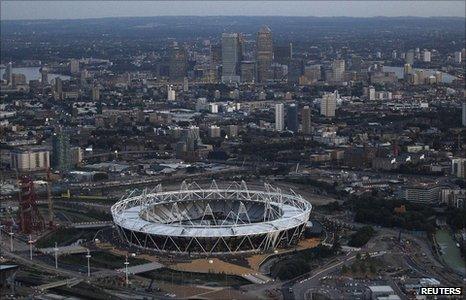
The Stratford stadium will become West Ham's home after the 2012 Games
It is a year since West Ham and Tottenham made their bids for London's Olympic Stadium, and since then the process has been fraught with wrangling over which football club would finally claim the prized venue.
30 September 2010: The deadline for organisations hoping to take over the stadium site passes, with the Olympic Park Legacy Company (OPLC) hoping to select a tenant by March 2011. The final decision will be agreed by London Mayor Boris Johnson and the government. The OPLC declines to say how many firms have applied, but adds the winner must retain the stadium as a "distinctive physical symbol" and support the regeneration of the area.
12 November 2010: West Ham and Tottenham are named as the two preferred bidders. West Ham, which teamed up with Newham Council for their application, want to create a 60,000-capacity arena for football, athletics, concerts and community use. Tottenham's collaboration with AEG, which runs the London's O2 Arena, results in plans for an 80,000-seat venue.
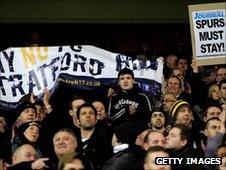
Tottenham fans did not want their club to move to Stratford
12 January 2011: Tottenham confirm they would demolish most of the Olympic Stadium if they win because they say the venue is not suitable for football, with seats being too far away from the pitch. Architect David Keirle says the club would use its own money to redevelop the stadium for its own use.
20 January 2011: Labour-run Newham Council arranges a £40m loan to finance West Ham's potential move into the venue after councillors vote in favour of the loan, calling it a "strong package". The council uses its credit rating to arrange a Treasury loan on more favourable terms than the football club could have secured.
11 February 2011: West Ham wins the backing of Olympic bosses in the battle for the 2012 stadium with a vote of 14-0. The OPLC decides the offer from the club - which would retain the athletics track - is better than Tottenham's rival bid.
13 February 2011: West Ham can have retractable seating for the Olympic Stadium provided it can fulfil its promise to athletics, sports minister Hugh Robertson says.
3 March 2011: West Ham's move to the Olympic Stadium after the 2012 Games is approved by the government and Boris Johnson.
30 March 2011: Tottenham demand answers from Olympics chiefs ahead of possible court action over West Ham's bid. The OPLC confirms it received written questions from lawyers for the north London club. The OPLC has four weeks to respond, after which Tottenham could request a judicial review.
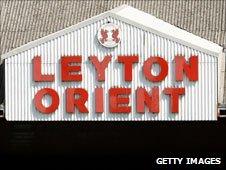
The planned move left League One Leyton Orient fearing for their future
13 April 2011: Tottenham launch legal action at London's High Court over West Ham's bid. Spurs say they have sought permission from the court to bring a claim against Newham Council over its £40m loan for the bid. It is believed Tottenham will ask the judicial review to consider whether the council was right to use public money for the loan, and whether it went through proper processes before doing so.
14 April 2011: Leyton Orient launch a legal bid over West Ham's move to the stadium. Bosses apply for a judicial review, saying the Hammers' move to the nearby stadium would have a "devastating" effect on the League One club's fan-base.
10 May 2011: Tottenham start a second High Court legal action over West Ham's bid. They now want the roles of the Olympic Park Legacy Company (OPLC) and two government departments involved in making the decision to be reviewed. Tottenham add they are continuing discussions with both local and national government bodies to seek to agree a "feasible stadium solution".
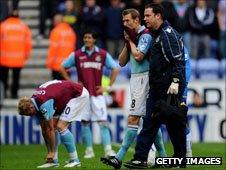
West Ham were relegated from the Premier League in May
16 May 2011: West Ham say they still plan to move into the Olympic Stadium, despite being relegated from the Premier League. The team's spokesman says the club's original bid made provisions for both Premier League and Championship football.
1 July 2011: OPLC director Dionne Knight is suspended after it emerges she worked for West Ham during their bid for the stadium, doing "paid consultancy work" without her manager's knowledge. She is suspended on full pay while any possible conflict of interest is investigated. Ms Knight also reveals "a personal relationship" with a Hammers employee when she started at the OPLC. The OPLC and West Ham say she had no involvement in the decision to back the Hammers. Tottenham say they are consulting lawyers over Ms Knight's suspension.
3 July 2011: West Ham take legal action against Tottenham and The Sunday Times over allegations about the Olympic Stadium bidding process. West Ham say they are treating the claims "with the utmost seriousness".
5 July 2011: An independent review is to be held into the process of awarding the Olympic Stadium to West Ham, the OPLC says. It appoints auditors Moore Stephens to investigate its own internal stadium procedures and asks an independent barrister to consider the nature of Ms Knight's consultancy work.
12 July 2011: Sports Minister Hugh Robertson appeals to Tottenham not to put London's bid for the 2017 World Athletics Championship at risk. On 1 September, the International Association of Athletics Federations (IAAF) will announce candidate cities. If the legal action is continuing after then, the bid for the championships may have to be withdrawn.
24 August 2011: Tottenham win the right to challenge the decision to hand over the Olympic Stadium to West Ham. High Court judge Mr Justice Collins rules they had an "arguable" case and a full hearing will begin on 18 October.
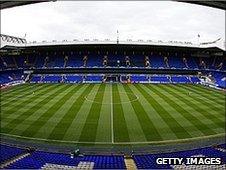
White Hart Lane's current capacity is just over 36,000
28 September 2011: Tottenham are offered a deal which could save it £17m if it stays in north London. The Greater London Authority (GLA) and Haringey Council offer to relieve the club of all community infrastructure payments that planners would normally require.
11 October 2011: The deal to award West Ham the Olympic Stadium after the London 2012 Games collapses, the government confirms. The board of the Olympic Park Legacy Company (OPLC) ends negotiations amid concerns over delays caused by the legal dispute with Tottenham. The OPLC, government and Mayor of London have instead agree the stadium will remain in public ownership. West Ham welcomes the move, saying it will bid to be the stadium tenants. Leyton Orient's chairman Barry Hearn adds: "This represents a total victory for Leyton Orient Football Club and we are delighted."
- Attribution
- Published11 October 2011
- Published4 October 2011
- Published20 September 2011
- Attribution
- Published11 February 2011